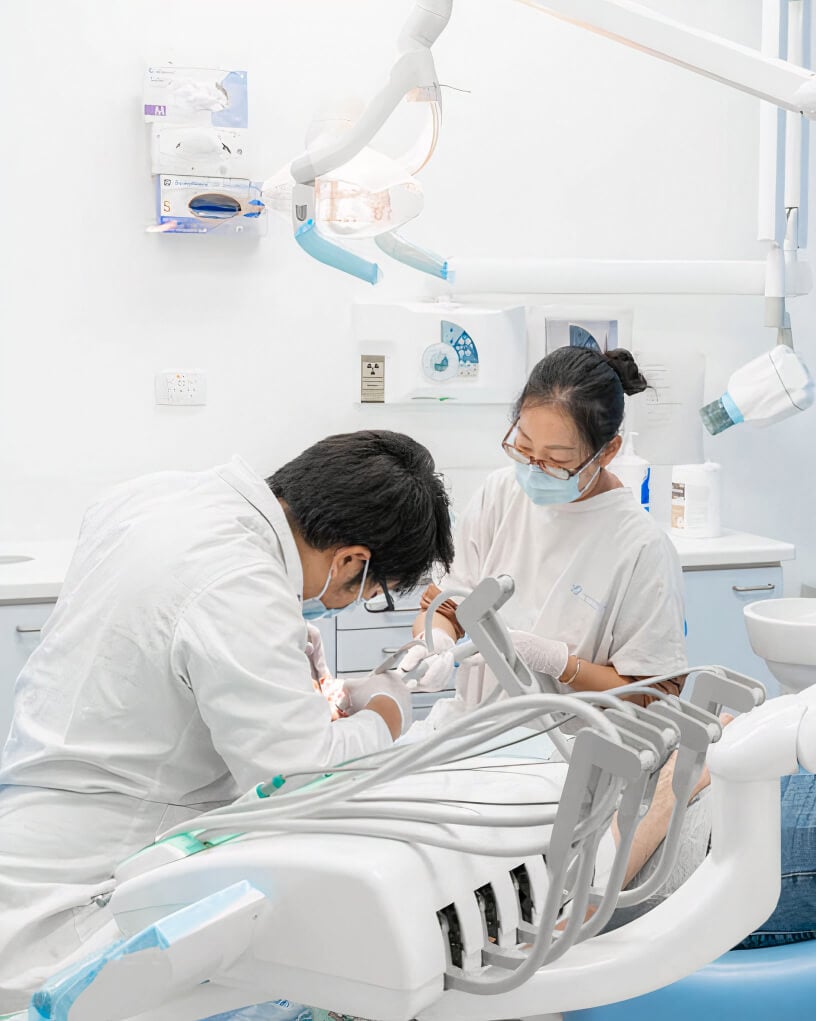WELCOME TO OUR DENTAL CARE | DENTAL PRACTICE IN DRUMMOYNE NSW
WELCOME TO OUR DENTAL CARE | DENTAL PRACTICE IN DRUMMOYNE NSW


On your initial examination, your teeth and your gums will be diagnosed by your dentist in Drummoyne. An x-ray and a periodontal probe will be done to check the bone levels around the teeth. Our patients will have their gums checked for:

As we eat and function every day, we harbour billions of bacteria in our mouths. Our mouth is a perfect ecosystem complete with nutrients and undisturbed pockets underneath our gums. Over time, the calcium will harden the plaque and form tartar. Unfortunately, this cannot be cleaned, and you will need to visit your dentist every 6 months to get it removed.
The bacteria will continually release toxins that cause your gums to recede and allow more space for the bacteria to grow along your tooth roots. This vicious cycle continues until your gums can not hold your teeth anymore, and your teeth need to be taken out.
There are some situations where a person would be more likely to develop gum disease and require gum disease treatment. Our Drummoyne patients should be aware of the following:
Gum disease, also known as periodontal disease, is a common condition that affects many adults in Sydney. It is caused by bacterial infections that attack the gums and other tissues that surround and support the teeth.
If left untreated, gum disease can cause a wide range of oral health problems, including tooth loss and bone damage. Here are some signs you should see a dentist for gum disease treatment in Sydney.
The bacteria that causes gingivitis causes inflamed gums. If left untreated, inflamed gums can create pockets around the teeth and lead to tooth loss. This is why those who have inflamed gums should consider visiting a dentist in Drummoyne, Sydney.
Inflamed gums may be redder in appearance instead of pink. Your gum may feel painful or tender and bleed easily when you brush or floss your teeth.
The truth is, your mouth is home to billions of bacteria. And if you do not brush your teeth regularly, the bacteria in your mouth feed on the plaque buildup. The more plaque you have, the more bacteria feed and cause bad breath.
So, the more of that you have, the bigger the buffet of bacteria is there inside your mouth causing bad breath. It’s because bacteria release toxins that can irritate both your gums and teeth and give off a foul smell.
Bad breath is a warning sign of gum disease. So, if you have chronic bad breath that doesn’t go away with proper oral hygiene, it might be time to see a dentist for gum disease treatment.
Your gums are likely shrinking if they look longer than they used to. Gum recession is a symptom of advanced periodontitis and can have serious side effects. When the bone starts to seize up, the gums start separating from the tooth which creates a pocket called receding gums. Loss of gum tissue around the teeth can lead to exposed roots or result in tooth loss.
Keep in mind that the treatment for advanced periodontitis can involve antibiotics, scaling, and grafting.
Ever tried sipping a cold drink and it made you wince? It’s probably because your teeth are extra sensitive and telling you something that you shouldn’t ignore.
Temperature sensitivity in teeth, specifically, is a symptom of gum disease that occurs alongside gum recession. With gum recession, the sensitive part of your tooth — known as dentin — is exposed causing sensitive teeth when exposed to cold water.
If your teeth are more sensitive to hot or cold food and beverages than usual, seek gum disease treatment from a dentist in Sydney.
Have you noticed that your smile looks a little bit different lately? Gum disease can damage the bones that hold teeth in place, causing them to shift, wiggle, or loosen. It can even change the way your teeth fit together when you bite. The good news is, after your gum disease treatment in Sydney, your dentist can offer various teeth straightening solutions i.e Invisalign or braces.
At Our Dental Care, the leading dental clinic in Drummoyne, our goal is to control your infection. Our dentist will examine your teeth and gums to know where to start treating your gum disease.
The first line of treatment for gum disease is in-depth, careful cleaning. Compared to regular cleaning, which is typically only done above your gum line, our dentists deeply clean your gum line using special dental instruments.
Our dentists can also save your gums with dental scaling. This dental treatment scrape off tartar both above and below your gum line. It helps to stop the harmful effects of gum disease and keeps your mouth healthy. This is usually done if a patient has chronic periodontal disease.
We can also treat gum disease through root planning. Generally, it is one of the initial steps in treating gum and bone disease. It helps to remove bacteria along their toxins, tartar, and other diseased deposits from the surfaces of tooth roots to smoothen out and reattach the gums to your tooth.
It’s important to have extra care for your gums to ensure proper healing, especially if your treatment plan includes surgery. You can follow all of our instructions and tips for after-care for gum disease treatment below.
Our dentist will likely book you for another visit to check how your gums have healed and if these after-care tips are working for you. If you’re worried that you might lose teeth because of gum disease, it won’t happen if you immediately take action by going to a dental clinic in Drummoyne, Sydney — Our Dental Care!

